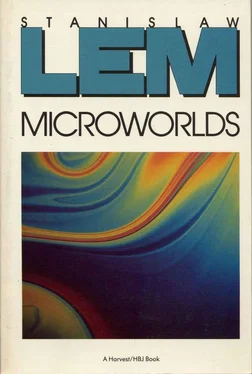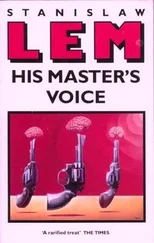But it is not true, even in a purely mathematical sense, that anything can happen, because there are infinities of quite different powers. Let us leave mathematics alone, however. Science fiction can be either “real science fiction” or “pseudo-science fiction.” When it produces fantasy, like Kafka’s, it is only pseudo-science fiction, because it then concentrates on the content to be signaled. What meaningful and total relationships obtain between the telegram “Mother died, funeral Monday” and the structure and function of the telegraphic apparatus? None. The apparatus merely enables us to transmit the message, which is also the case with semantically dense objects of a fantastic nature, such as the metamorphosis of man into bug, that nevertheless transmit a realistic communication.
If we were to change railway signals so that they ordered the stopping of trains in moments of danger not by blinking red lights but by pointing with stuffed dragons, we would be using fantastic objects as signals, but those objects would still have a real, nonfantastic function. The fact that there are no dragons has no relationship to the real purpose or method of signaling.
As in life we can solve real problems with the help of images of nonexistent beings, so in literature can we signal the existence of real problems with the help of prima facie impossible occurrences or objects. Even when the happenings it describes are totally impossible, a science-fiction work may still point out meaningful, indeed rational, problems. For example, the social, psychological, political, and economic problems of space travel may be depicted quite realistically in science fiction even though the technological parameters of the spaceships described are quite fantastic in the sense that it will for all eternity be impossible to build a spaceship with such parameters.
But what if everything in a science-fiction work is fantastic? What if not only the objects but also the problems have no chance of ever being realized, as when impossible time-travel machines are used to point out impossible time-travel paradoxes? In such cases science fiction is playing an empty game.
Since empty games have no hidden meaning, since they represent nothing and predict nothing, they have no relationship at all to the real world and can therefore please us only as logical puzzles, as paradoxes, as intellectual acrobatics. Their value is autonomous, because they lack all semantic reference; therefore they are worthwhile or worthless only as games. But how do we evaluate empty games? Simply by their formal qualities. They must contain a multitude of rules; they must be elegant, strict, witty, precise, and original. They must therefore show at least a minimum of complexity and an inner coherence; that is, it must be forbidden during the play to make any change in the rules that would make the play easier.
Nevertheless, ninety to ninety-eight percent of the empty games in science fiction are very primitive, very naïve one-parameter processes. They are almost always based on only one or two rules, and in most cases it is the rule of inversion that becomes their method of creation. To write such a story you invert the members of a pair of linked concepts. For example, we think the human body quite beautiful, but in the eyes of an extraterrestrial we are all monsters: in Sheckley’s “All the Things You Are” the odor of human beings is poisonous for extraterrestrials, and when they touch the skin of humans they get blisters, etc. What appears normal to us is abnormal to others — about half of Sheckley’s stories are built on this principle. The simplest kind of inversion is a chance mistake. Such mistakes are great favorites in science fiction: something that doesn’t belong in our time arrives here accidentally (a wrong time-mailing), etc.
Inversions are interesting only when the change is in a basic property of the world. Time-travel stories originated in that way: time, which is irreversible, acquired a reversible character. On the other hand, any inversion of a local kind is primitive (on earth humans are the highest biological species, on another planet humans are the cattle of intelligent dinosaurs; we consist of albumen, the aliens of silicon; etc.). Only a nonlocal inversion can have interesting consequences; we use language as an instrument of communication; any instrument can in principle be used for the good or bad of its inventor. Therefore the idea that language can be used as an instrument of enslavement, as in Delany’s Babel-17, is interesting as an extension of the hypothesis that world view and conceptual apparatus are interdependent; i.e., because of the ontological character of the inversion.
The pregnancy of a Virgo Immaculata; the running of 100 meters in 0.1 seconds; the equation 2 × 2 = 7; the pan-psychism of all cosmic phenomena postulated by Stapledon: these are four kinds of fantastic condition.
It is in principle possible, even empirically possible, to start embryogenesis in a virgin’s egg; although empirically improbable today, this condition may acquire an empirical character in the future.
It will always be impossible for a man to run 100 meters in 0.1 seconds. For such a feat a man’s body would have to be so totally reconstructed that he would no longer be a man of flesh and blood. Therefore a story based on the premise that a human being as a human being could run so fast would be a work of fantasy, not science fiction.
The product of 2 × 2 can never become 7. To generalize, it is impossible to realize any kind of logical impossibility. For example, it is logically impossible to give a logical proof for the existence or nonexistence of a god. It follows that any imaginative literature based on such a postulate is fantasy, not science fiction.
The pan-psychism of Stapledon is an ontological hypothesis. It can never be proved in the scientific sense: any transcendence that can be proved experimentally ceases to be a transcendence, for transcendence is by definition empirically unprovable. God reduced to empiricism is no longer God; the frontier between faith and knowledge can therefore never be annulled.
But when any of these conditions, or any condition of the same order, is described not to postulate its real existence, but only to interpret some content of a semantic character by means of such a condition used as a signal-object, then all such classificatory arguments lose their power.
What, therefore, is basically wrong in science fiction is the abolition of differences that have a categorical character; the passing off of myths and fairy tales for quasi-scientific hypotheses or their consequences, and of the wishful dream or horror story as prediction; the postulation of the incommensurable as commensurable; the depiction of the accomplishment of possible tasks with means that have no empirical character; the pretense that insoluble problems (such as those of a logical typus) are soluble.
But why should we deem such procedures wrong when once upon a time myths, fairy tales, sagas, fables were highly valued as keys to all cosmic locks? It is the spirit of the times. When there is no cure for cancer, magic has the same value as chemistry: the two are wholly equal in that both are wholly worthless. But if there arises a realistic expectation of achieving a victory over cancer, at that moment the equality will dissolve, and the possible and workable will be separated from the impossible and unworkable. It is only when the existence of a rational science permits us to rule the phenomena in question that we can differentiate between wishful thinking and reality. When there is no source for such knowledge, all hypotheses, myths, and dreams are equal; but when such knowledge begins to accumulate, it is not interchangeable with anything else, because it involves not just isolated phenomena but the whole structure of reality. When you can only dream of space travel, it makes no difference what you use as technique: sailing ships, balloons, flying carpets or flying saucers. But when space travel becomes fact, you can no longer choose what pleases you rather than real methods.
Читать дальше












